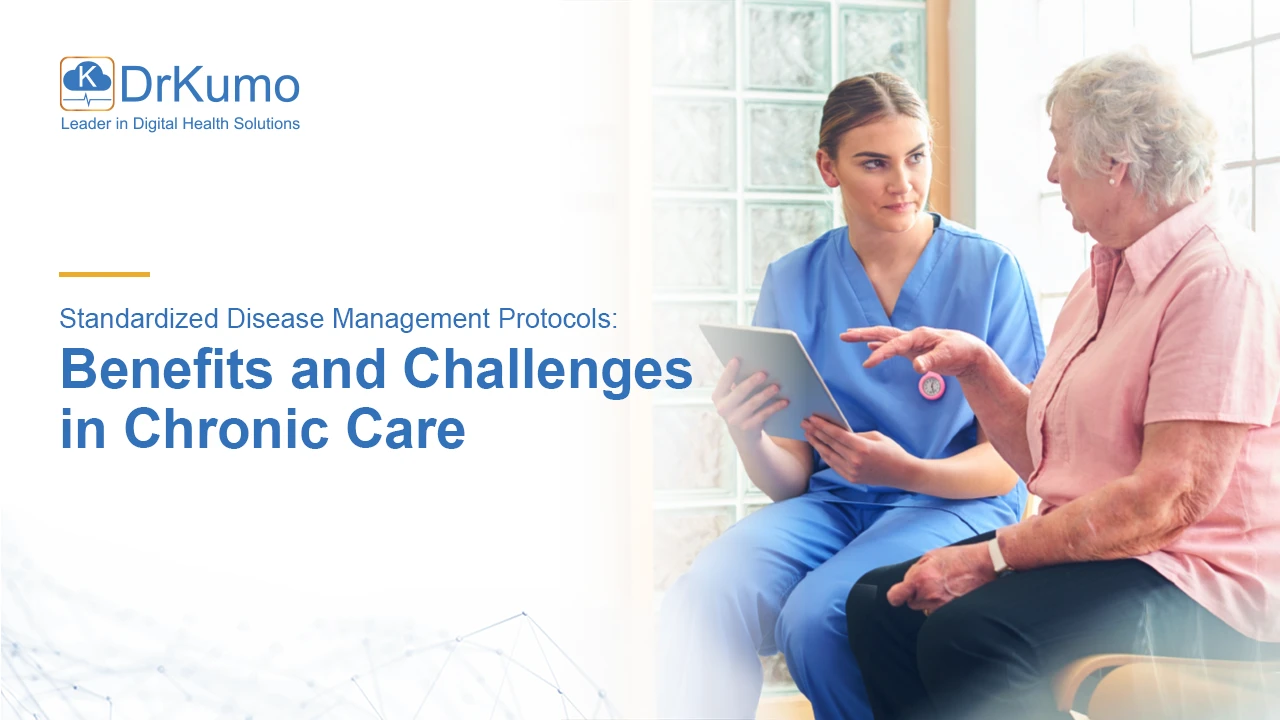Chronic care management (CCM) is an essential component of healthcare that focuses on the long-term management of chronic diseases such as diabetes, hypertension, and heart disease. Standardized chronic disease management protocols (DMPs) are structured approaches designed to improve the quality of care, enhance patient outcomes, and reduce healthcare costs. This blog explores the benefits and challenges of implementing standardized DMPs in chronic care.
Overview of Disease Management Protocols
What Are Disease Management Protocols?
Disease Management Protocols are systematic plans that outline the best practices and guidelines for managing chronic diseases. These protocols are based on evidence-based medicine and aim to standardize care delivery across different healthcare settings. They typically include guidelines for diagnosis, treatment, follow-up, and patient education, ensuring consistency and quality in patient care.
Importance of Standardization
Standardization in chronic disease management is crucial as it ensures that all patients receive the same level of care regardless of where they are treated. It helps in reducing variability in clinical practices, which can lead to improved patient outcomes and reduced healthcare costs. Standardized protocols also facilitate the implementation of quality improvement initiatives and enable better monitoring and evaluation of care practices.
Benefits of Standardized Disease Management Protocols
1. Improved Quality of Care
One of the primary benefits of standardized DMPs is the improvement in the quality of care provided to patients. By adhering to evidence-based guidelines, healthcare providers can ensure that patients receive the most effective treatments and interventions.
Studies have shown that standardized protocols can lead to better disease control, reduced complications, and improved overall health outcomes for patients with chronic conditions. According to a 2021 study published in Critical Care Management, implementing standardized sepsis protocols has been associated with decreased hospital mortality, from 20% to 10%, compared to before protocol implementation. Standardized protocols also improved adherence to important process measures like time to first antibiotics.
2. Enhanced Patient Engagement and Self-Management
Standardized DMPs often include components that focus on patient education and self-management. Educating patients about their conditions, treatment plans, and lifestyle modifications is crucial for improving adherence to treatment and empowering patients to take an active role in managing their health. Engaged patients are more likely to follow their care plans, monitor their symptoms, and make healthier lifestyle choices, leading to better health outcomes. For example, a 2009 study published in the Journal of Asthma found that standardized ventilator weaning protocols led to more rapid and higher rates of successful removal from mechanical ventilation compared to usual care. Standardized protocols also improved adherence to important process measures like time to first antibiotics.
3. Cost-Effectiveness
Implementing standardized DMPs can lead to significant cost savings for healthcare systems. By reducing hospital admissions, emergency room visits, and complications associated with chronic diseases, DMPs help in lowering overall healthcare costs.
According to Asthma Regional Council, proper asthma management can save at least25% of total asthma costs, which translates to close to $5 billion nationally, by controlling symptoms and reducing urgent care health services utilization. One study by CDC found that for every dollar invested in an asthma intervention, the payer saved 51 cents in healthcare costs over two years, resulting in a 51% return on investment.
4. Facilitates Data Collection and Analysis
Standardized protocols facilitate the collection of consistent and reliable data, which is essential for monitoring and evaluating the effectiveness of chronic care management programs. This data can be used to identify trends, measure outcomes, and make informed decisions about future improvements in care delivery.
It also enables healthcare providers to track patient progress and make necessary adjustments to treatment plans. The integration of advanced analytics tools with standardized DMPs allows for real-time monitoring and early identification of potential issues, thereby enhancing proactive care management.
Challenges in Implementing Standardized Disease Management Protocols
1. Initial Setup and Training Costs
One of the significant challenges in implementing standardized DMPs is the initial cost associated with setting up the protocols and training healthcare staff. Developing comprehensive protocols requires time, resources, and expertise. Additionally, training healthcare providers to adhere to these protocols can be time-consuming and costly.
2. Resistance to Change
Healthcare providers may resist adopting standardized protocols due to a preference for established practices or skepticism about the effectiveness of new guidelines. Overcoming this resistance requires effective communication, education, and demonstrating the benefits of standardized care practices.
3. Ensuring Compliance
Ensuring that all healthcare providers consistently follow standardized protocols can be challenging. Compliance monitoring and enforcement require robust systems and processes. It is essential to have regular audits, feedback mechanisms, and accountability measures in place to ensure adherence to the protocols.
4. Adapting to Individual Patient Needs
While standardized protocols provide a framework for care, they must be flexible enough to accommodate individual patient needs and preferences. Chronic disease management often requires personalized care plans tailored to the specific needs of each patient. Balancing standardization with personalization is crucial for the success of DMPs.
Integrating DrKumo Solutions with Disease Management Protocols
How DrKumo Enhances Disease Management
DrKumo offers innovative digital health solutions that align perfectly with standardized disease management protocols. DrKumo’s platform enhances patient engagement through user-friendly mobile apps and provides advanced remote patient monitoring devices that integrate seamlessly with electronic health records (EHR) systems. This integration ensures continuous monitoring, accurate data collection, and timely interventions, which are crucial for effective chronic care management.
Benefits of Using DrKumo’s Technology
DrKumo’s secure, HIPAA-compliant data transmission safeguards patient information, maintaining data integrity and compliance with regulatory requirements. By utilizing DrKumo’s technology, healthcare providers can support multidisciplinary care team coordination and continuous improvement in patient care, ensuring high-quality, patient-centered outcomes. For more information, visit Remote Patient Monitoring in CA, Disease Management Protocols, and Chronic Care Management.
Case Study and Evidence
Several studies have demonstrated the effectiveness of standardized DMPs in improving patient outcomes. For instance, a 2020 study published in NIH found the standardized glycemic management protocol is more effective than the conventional protocol in controlling postoperative blood glucose levels and reducing certain postoperative complications, such as ICU admission and acute kidney injury, in type 2 diabetes patients undergoing elective surgery. The standardized protocol’s structured approach to glycemic management appears to drive these improved outcomes.
Future Directions and Innovations
Advancements in Technology
The integration of advanced technologies such as artificial intelligence (AI) and machine learning (ML) into disease management protocols holds promise for further improving chronic care management. These technologies can analyze vast amounts of data, identify patterns, and provide predictive insights, enabling healthcare providers to make more informed decisions and deliver personalized care.
Policy and Regulatory Support
Policymakers play a crucial role in promoting the adoption of standardized disease management protocols. By providing regulatory support, incentives, and funding for the development and implementation of DMPs, governments can help overcome barriers and encourage widespread adoption of these protocols.
Conclusion
Standardized disease management protocols offer numerous benefits in chronic care, including improved quality of care, enhanced patient engagement, cost-effectiveness, and better data collection and analysis.
However, implementing these protocols also presents challenges such as initial setup costs, resistance to change, ensuring compliance, and adapting to individual patient needs. By leveraging innovative digital health solutions like those offered by DrKumo and addressing these challenges through effective strategies, healthcare providers can significantly enhance the management of chronic diseases through diabetes disease management protocol and improve patient outcomes.
For more information on how DrKumo’s advanced digital health solutions can help you implement effective disease management protocols, enhance patient outcomes, and streamline chronic care management, contact us today.
Disclaimer: This content is for informational purposes only and should not be considered as legal or medical advice. Always consult with a qualified professional regarding any specific legal or medical concerns.








